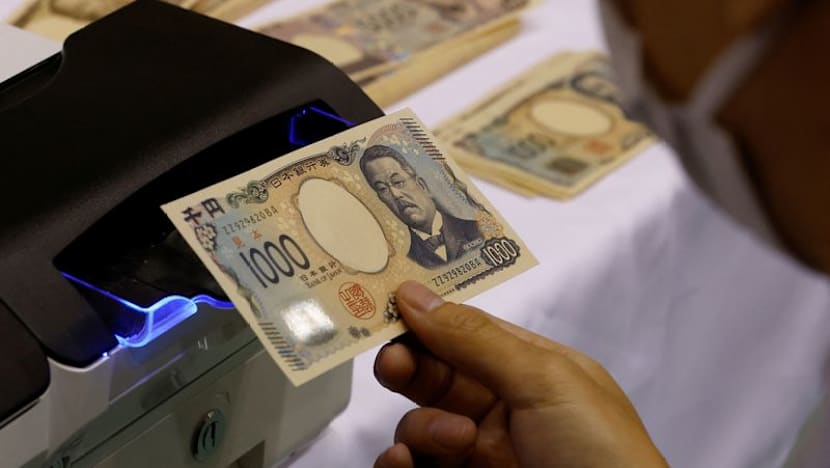Top Stories
Yen and Euro Face Significant Weekly Losses Amid Economic Concerns

The yen and euro are both experiencing considerable declines this week, with the yen on track for its steepest drop in a year, while the euro struggles near two-month lows. This downturn is largely attributed to shifting monetary policy expectations and political instability in Europe.
The Japanese yen stabilized on Friday, trading at 152.61 per dollar, but it is set to record a 3.5 percent weekly loss, marking its biggest decline since September 2024. Concerns about a potential interest rate hike by the Bank of Japan (BOJ) have diminished following the election of fiscal dove Sanae Takaichi as the leader of the ruling party. This has raised fears that Japanese authorities may need to intervene to support the currency.
Japanese Finance Minister Katsunobu Kato expressed concern about excessive volatility in the foreign exchange market. “Today was the first time that the Minister of Finance expressed a verbal intervention, cautioning about excessive moves in the yen,” noted Marc Chandler, chief market strategist at Bannockburn Global Forex in New York. Last year, officials highlighted issues when the yen weakened by 10 yen in a month, and Chandler indicated that a similar move today could signal concerns if the currency approaches the 155.5 yen level.
Takaichi stated her intention to avoid triggering excessive declines in the yen, emphasizing that the BOJ must align its monetary policy with the government’s objectives. She is poised to become prime minister following a parliamentary vote expected on October 15, 2024, though this date may be postponed due to a withdrawal of support from the Liberal Democratic Party’s junior coalition partner, Komeito.
In the meantime, traders are pricing in a 45 percent chance of a rate hike at the BOJ’s December meeting, with only a 25-basis-point increase anticipated by March.
Political turmoil in France is impacting the euro, which is also on track for its largest weekly decline since November, down 1.5 percent. The euro was steady at $1.1565 as President Emmanuel Macron convened a critical meeting with political leaders at the Élysée Palace. This meeting is pivotal as Macron faces a self-imposed deadline to appoint a new prime minister while the country’s central bank chief warns that political disorder is hindering economic growth.
The ongoing political paralysis complicates efforts to pass a budget aimed at reducing the deficit, further exacerbating concerns about France’s economic stability alongside evidence of slowing momentum in Germany. Jane Foley, chief strategist at Rabobank, remarked, “The data from Germany’s not good, and therefore I think that makes the euro a little bit more susceptible to wobbles on the French news.”
The dollar index, which measures the U.S. currency against six others, has reached a two-month high and is on track for a weekly increase of 1.66 percent, its largest gain in a year. Chandler pointed out that significant technical damage has been inflicted on foreign currencies this week. Traders are closely monitoring developments regarding the reopening of the U.S. federal government, which will impact the release of key economic data influencing Federal Reserve policy.
According to reports from the New York Times and Bloomberg, the U.S. Bureau of Labor Statistics is recalling furloughed workers to ensure the timely release of its benchmark report on inflation, despite the ongoing federal shutdown. Currently, markets are pricing in a 95 percent likelihood that the Federal Reserve will cut rates by 25 basis points at its upcoming October meeting, with an 82 percent chance of an additional cut in December, based on data from the CME Group’s FedWatch Tool.
In contrast to the dollar’s strength, the Canadian dollar gained against the greenback, rising 0.22 percent to C$1.4 per dollar after data revealed a surprise increase of 60,400 net jobs in Canada for September. In the cryptocurrency market, bitcoin saw a modest increase of 0.70 percent, reaching $122,024.
The financial landscape remains uncertain, with movements in currency values reflecting broader economic conditions and political developments across the globe.
-

 Business5 months ago
Business5 months agoKenvue Dismisses CEO Thibaut Mongon as Strategic Review Advances
-

 Lifestyle4 months ago
Lifestyle4 months agoHumanism Camp Engages 250 Youths in Summer Fest 2025
-

 Sports4 months ago
Sports4 months agoDe Minaur Triumphs at Washington Open After Thrilling Comeback
-

 Sports5 months ago
Sports5 months agoTupou and Daugunu Join First Nations Squad for Lions Clash
-

 Top Stories5 months ago
Top Stories5 months agoColombian Senator Miguel Uribe Shows Signs of Recovery After Attack
-

 World5 months ago
World5 months agoASEAN Gears Up for Historic Joint Meeting of Foreign and Economic Ministers
-

 Health4 months ago
Health4 months agoNew Study Challenges Assumptions About Aging and Inflammation
-

 Business5 months ago
Business5 months agoOil Prices Surge Following New EU Sanctions on Russia
-

 Entertainment4 months ago
Entertainment4 months agoDetaşe-Sabah Violin Ensemble Captivates at Gabala Music Festival
-

 Entertainment4 months ago
Entertainment4 months agoBaku Metro Extends Hours for Justin Timberlake Concert
-

 Top Stories5 months ago
Top Stories5 months agoRethinking Singapore’s F&B Regulations Amid Business Closures
-

 Business5 months ago
Business5 months agoU.S. House Approves Stablecoin Bill, Sends to Trump for Signature









